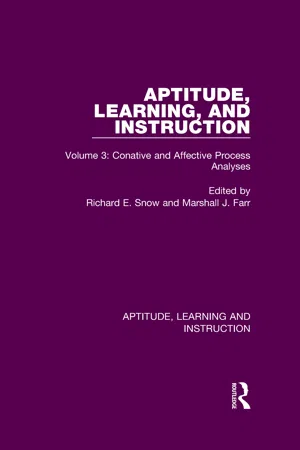
Aptitude, Learning, and Instruction
Volume 3: Conative and Affective Process Analyses
- 384 pages
- English
- ePUB (mobile friendly)
- Available on iOS & Android
Aptitude, Learning, and Instruction
Volume 3: Conative and Affective Process Analyses
About this book
Originally published in 1987, this book reports the proceedings of a conference held in 1983 at Stanford, California. The purpose of the conference was to bring together individuals whose research reflected advanced theoretical thinking and empirical evidence on the combined analysis of cognitive, conative, and affective processes, the role of these processes in learning from instruction, and the importance of individual differences therein. The Editors believed that this volume made an early and important contribution to the reemphasis and reexamination of the conative and affective aspects of human performance, in coordination with cognitive psychology, in the study of aptitude, learning, and instruction. It takes its place as Volume 3 of the Aptitude, Learning, and Instruction series.
Tools to learn more effectively

Saving Books

Keyword Search

Annotating Text

Listen to it instead
Information
1
Cognitive-Conative-Affective Processes in Aptitude, Learning, and Instruction An Introduction
Conference Background
Research Background
Historically, three modes of mental functioning...
Table of contents
- Cover
- Half Title
- Title Page
- Copyright Page
- Original Title Page
- Original Copyright Page
- Table of Contents
- Dedication
- Preface
- 1. Cognitive-Conative-Affective Processes in Aptitude, Learning, and Instruction: An Introduction
- 2. Aptitude Complexes
- 3. Structural Relationships Across Cognition, Personality, and Style
- 4. Intelligence and Cognitive Style
- 5. Cerebral, Cognitive, and Conative Processes
- 6. Test Anxiety, Cognitive Interference, and Performance
- 7. The Influence of Positive Affect on Cognitive Organization: Implications for Education
- 8. Thinking about Feelings: The Development and Organization of Emotional Knowledge
- 9. Some Educational Implications of Sympathy and Anger from an Attributional Perspective
- 10. Making Learning Fun: A Taxonomy of Intrinsic Motivations for Learning
- 11. Intrinsic Motivation and Instructional Effectiveness in Computer-Based Education
- 12. Interestingness of Children’s Reading Material
- 13. If You Don’t Know It Work On it: Knowledge, Self-Regulation and Instruction
- 14. Discussion
- 15. Discussion
- 16. Discussion
- 17. Cognition, Affect and Motivation: Issues, Perspectives and Directions Toward Unity
- Author Index
- Subject Index
Frequently asked questions
- Essential is ideal for learners and professionals who enjoy exploring a wide range of subjects. Access the Essential Library with 800,000+ trusted titles and best-sellers across business, personal growth, and the humanities. Includes unlimited reading time and Standard Read Aloud voice.
- Complete: Perfect for advanced learners and researchers needing full, unrestricted access. Unlock 1.4M+ books across hundreds of subjects, including academic and specialized titles. The Complete Plan also includes advanced features like Premium Read Aloud and Research Assistant.
Please note we cannot support devices running on iOS 13 and Android 7 or earlier. Learn more about using the app